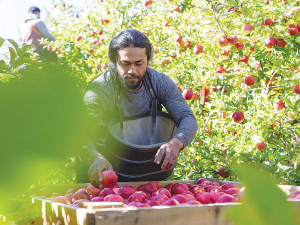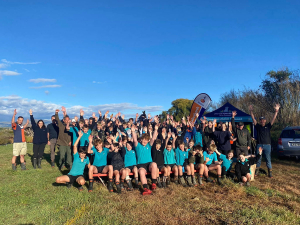Free online training created to attract Kiwis into horticulture took home two awards at the recent international LearnX Live! Awards.
In early 2021, New Zealand Apples and Pears Inc., GoHort and eCampus NZ launched a series of ten short courses to attract job seekers and career changers into jobs and training in the primary industries.
The courses, which were created in response to labour shortages caused by Covid-19 border restrictions, won a Diamond award in the Best Pandemic Response category. Other award winners for the category included The Hong Kong Polytechnic University and Victoria University Polytechnic.
Erin Simpson from New Zealand Apples & Pears Inc. says the courses, which are open to everyone, represent the horticulture industry’s “public front door.”
“Workers displaced from jobs as a result of Covid-19 can use these taster courses to find a home in the horticulture industry and understand how their current skillset will support them in our industry,” he says.
The courses are being promoted through the Ministry for Primary Industries’ ‘Opportunity Grows Here’ campaign, which was launched last year to help New Zealanders find employment opportunities in the primary sector.
The team also took home a Diamond LearnX award in the Best Bite Sized eLearning Design category.
Employers, industry bodies, and the education sector are increasingly exploring ‘bite-sized’ learning opportunities - or micro-credentials - as an alternative to longer, on-campus qualifications.
This style of learning helps Kiwis upskill, adapt to rapidly changing technology, or gain specialist skills, quickly and at low cost, without pushing pause on their lives to study.
Anyone interested in entering the horticulture industry can enrol in the free courses and complete up to ten courses. Learners are awarded a digital badge when they successfully complete each course, which can be displayed on a resume and shared on social media and professional networking sites.
The resources in the courses were designed so they can be used in other contexts, and the team hopes to see them re-used and repurposed by other horticulture sectors and as part of relevant NZQA-approved programmes.
Eastern Institute of Technology (EIT) has already integrated the courses into Primary Industries programmes. In addition to gaining digital badges, what students learn in the courses is recognised as part of their work towards an NZQA accredited qualification.
"EIT sees the badges as an innovative component of our Primary Industries qualifications. The online delivery of the badges helps meet the literacy requirements of our programmes and the content helps meet the graduate profile outcomes across a variety of qualifications, particularly the health and safety badge. We are embedding the badges into as many of our programmes as possible," said Paul Keats from EIT’s School of Primary Industries.,” Simpson says.
He says he has been heartened by the way the education sector and industry experts are collaborating to address the challenges New Zealand is facing as a result of Covid-19.
"This is a great example of collaborative work between industry and New Zealand’s education sector to offer agile, timely, adaptable learning opportunities in response to specific industry challenges such as labour shortages.”


















